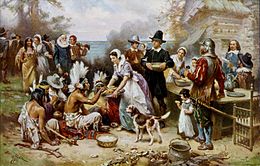History Behind Thanksgiving: Glorifying Colonization?

Courtesy of Wikepedia
December 12, 2016
Most people are aware that the Thanksgiving holiday in the United States originates from a feast in 1621 between European colonists and the Wampanoag tribe in Plymouth, Massachusetts; although, did you know that this “feast” was actually believed to be a three-day long festival? That the colonists and Native Americans likely ate lobster in addition to turkey? Or that Thanksgiving did not actually become a national holiday until President Abraham Lincoln approved it in 1863?
That rather than representing a peaceful collaboration, the feast occurred amidst tumultuous and violent exchanges between colonists and Native Americans? Similar to these seemingly minor Thanksgiving details of which many people are unaware, many Americans also mistakenly believe that this sole instance of alleged collaboration between Europeans and Native Americans represents the peaceful effects of colonization; however, this distorted misrepresentation of the origin of the holiday can have severe implications.
In reality, with European colonization came deadly diseases, such as smallpox and measles, that wiped out millions of Native Americans. In addition to these devastating effects, colonists also viciously murdered Native Americans and violently forced them off their land; in fact, Plymouth’s Thanksgiving is actually one of the only recorded examples of harmonious relations between the colonists and natives. At Plymouth and in the context of the “Thanksgiving Feast” in 1621, it is true that colonists used the tips and strategies taught to them by the natives to survive; however, despite their assistance, the colonists also likely viewed Native Americans as obstacles to their own wealth and success. Consequently, the idea that the holiday represents total collaboration is ingenuous.
Therefore, on Thanksgiving, when Americans stop and express their gratitude for the freedom and rights guaranteed to them as citizens of the United States, they all too often fail to pause and recognize the cost at which these privileges were granted. Realistically, they were granted largely as an effect of brutal racism and barbaric treatment of Native Americans. In celebrating these blessings, while failing to acknowledge the colonists’ horrific conduct, Americans inadvertently validate this oppression as a necessary price for their advantaged lives today.
Ultimately, I absolutely do not believe that we should stop celebrating Thanksgiving or voicing our appreciation for our gifts and opportunity as Americans, but I do recognize that the way in which many Americans view the holiday needs to dramatically change. Articulating our appreciation for our blessings on Thanksgiving, while also acknowledging and denouncing the racist ideals from which it originates, will truly help us all to recognize and embrace our equality -and diversity- as Americans.


